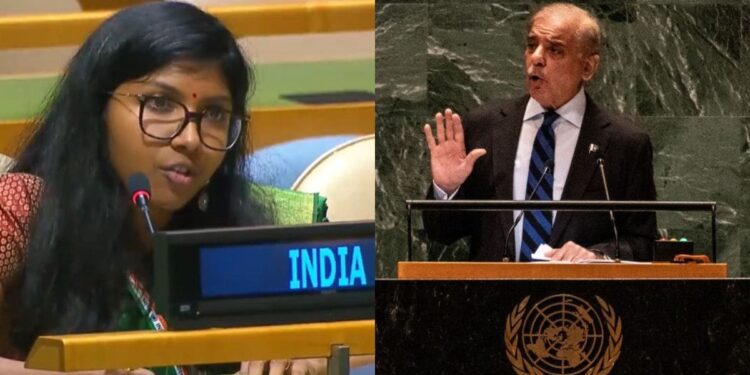Lagatar24 Desk
New Delhi: India delivered a sharp rebuttal at the United Nations General Assembly (UNGA) following Pakistan Prime Minister Shehbaz Sharif’s address, in which he raised the Jammu and Kashmir issue and criticized India’s actions. In response, India warned Pakistan that its continued support for cross-border terrorism will “inevitably invite consequences.”
India’s Firm Response to Pakistan
India’s First Secretary to the UN, Bhavika Mangalanandan, took the floor to counter Mr. Sharif’s remarks, accusing Pakistan of being a hub for global terrorism and for consistently using cross-border terrorism as a state policy. Her pointed response came after Mr. Sharif’s speech, where he called on India to reverse the 2019 abrogation of Article 370, which revoked the special status of Jammu and Kashmir, and demanded dialogue between the two countries.
“This Assembly regrettably witnessed a travesty this morning. A country run by the military, with a global reputation for terrorism, narcotics trade, and transnational crime has had the audacity to attack the world’s largest democracy,” said Ms. Mangalanandan. She further added, “The world can see for itself what Pakistan really is.”
Accusations Against Pakistan’s Role in Terrorism
Ms. Mangalanandan accused Pakistan of being complicit in global terrorism, referencing attacks by Pakistan-based terror groups, such as the 2001 Indian Parliament attack and the 2008 Mumbai attacks. She emphasized that Pakistan’s involvement in terrorist activities around the world is undeniable, stating, “Pakistan’s fingerprints are on many terrorist incidents globally.”
She called out Mr. Sharif’s speech as “audacious” and said that Pakistan’s calls for a dialogue are futile unless the issue of terrorism is addressed. “There can be no compact with terrorism,” she remarked, reiterating India’s position on Pakistan’s history of harboring terrorists like Osama bin Laden.
India’s Call for Action Against Terrorism
India made it clear that any discussions on regional peace and stability with Pakistan, such as the proposed “Strategic Restraint Regime,” are irrelevant unless the threat of terrorism is eliminated. Ms. Mangalanandan also highlighted Pakistan’s ongoing interference in Jammu and Kashmir, accusing it of using terrorism to disrupt the democratic process in the region.
She also took the opportunity to call out Pakistan for its internal issues, including human rights abuses, specifically referring to the 1971 genocide in Bangladesh and the persecution of minorities within Pakistan. “It is ridiculous for Pakistan to lecture the world about intolerance given its own record,” she said.
Pakistan’s Response
Following India’s response, Pakistan exercised its Right of Reply, rejecting India’s claims as “baseless and misleading.” Pakistan reiterated its demand for a referendum in Jammu and Kashmir, citing UN Security Council resolutions.
India’s strong stance at the UN underscores its ongoing concerns about Pakistan’s support for terrorism and its interference in internal matters, especially Jammu and Kashmir.







